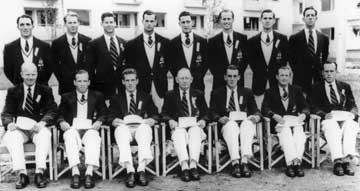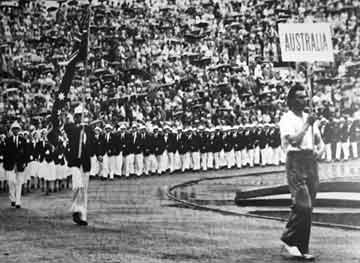Olympic Games—Helsinki 1952
Selection
Selection of the eight was undertaken 12 months in advance of the Olympic Games which meant that the crew raced the 1952 King's Cup for NSW during its preparation. The crew was comprehensively beaten by Victoria by four lengths with the media claiming it should be nominated in place of the NSW crew. The NSW were far from their best having suffered severely from adverse reactions from the vaccinations for overseas travel. The stroke Phil Cayzer lost 20 lb in three days and he was only one of five affected. It was also mentioned that their fundraising responsibilities, some 7,000 pounds, impacted their preparation.

1952 Rowing Team
Back row: EW Chapman, DR Anderson, AJ Rodgers, N Greenwood, EOG Pain, MD Finlay, VR Middleton, G Williamson. Seated: DR Palmer, PA Cayzer, MS Riley, J Berkery (Manager), MT Wood, TEM Chessell, RN Tinning.
Selector Gould had faith in the crew and stood by his decision. To the credit of the crew and Gould, the eight won a bronze medal. The selection of an eight oared crew was significant in such a small sized Australian Olympic team of 96 people. The AOF later advised that if it had not been for their defeat of the highly acclaimed American crew at the Christchurch Games in New Zealand in 1951, an eight would not have been sent. The AOF still could only fund four seats for the eight.
The selection of Merv Wood in the single was automatic following his gold medal in London in 1948 and his wins in the President's Cups in 1949, 1950, 1951 and 1952. Selections for the other crews depended both on standard and finances.
Test races in Ballarat were conducted for the remaining crews. The double scull won their right to compete at these test races. The coxless pair were the emergencies for the eight and raced. A coxed pair from Melbourne Rowing Club of Noel S Wills (Vic), Murray A Christie (Vic) and cox J Bailey (Vic) was also nominated but not approved due to lack of finances.
It is interesting to note that no coaches were selected. Reports from those involved noted that the crews suffered from this lack of coaching support and a good training program. Phil Cayzer, stroke of the eight, received an Order of Australia Medal in 1992 for his lifetime service to rowing.

Sculler Mervyn Wood carries the flag for Australia in the Opening Ceremony
Australian Team
Men's Single Scull – Silver
- Mervyn T Wood (NSW)
Men's Double Scull – Eliminated in repechage
- Bow: A John Rodgers (NSW)
- Str: Murray S Riley (NSW)
Men's Pair – Eliminated in repechage
- Bow: Don R Palmer (NSW)
- Str: Victor R Middleton (NSW)
Men's Eight – Bronze
- Bow: Robert N Tinning (NSW)
- 2: Ernest W Chapman (NSW)
- 3: Nimrod Greenwood (NSW)
- 4: David R Anderson (NSW)
- 5: Geoff Williamson (NSW)
- 6: Mervyn D Finlay (NSW)
- 7: Edward O G Pain (NSW)
- Str: Phillip A Cayzer (NSW)
- Cox: Thomas E M Chessell (NSW)
Manager: Jack R Berkery (TAS)
Selector: A B (Joe) Gould (NSW) was the sole selector for the
eight.
Mervyn Wood had the honour of being Australia's flag bearer at the Opening Ceremony.
Racing
The first two of the qualifying heats progressed to the semi finals. Then the winners of the first repechages raced the losers of the semi-finals with the others eliminated. The winners of the semi-finals progressed to the final. The winners of the second repechages progressed to the final.
Men's Eight
E1: 1st YUG, 2nd AUS, 3rd ROM, 4th CAN, 5th FIN
E2: 1st USA, 2nd GBR, 3rd FRG, 4th SWE, 5th POR
E3: 1st URS, 2nd HUN, 3rd ITA, 4th DEN
1R1: 1st DEN, 2nd ROM, 3rd POR
1R2: 1st FRG, 2nd ITA, 3rd FIN
1R3: dead-heat CAN and SWE
SF1: 1st GBR, 2nd YUG, 3rd HUN
SF2: 1st USA, 2nd URS, 3rd AUS
2R1: 1st AUS, 2nd YUG, 3rd SWE
2R2: 1st URS, 2nd HUN, 3rd DEN
2R3: 1st FRG, 2nd CAN
Final: 1st USA (Franklin Shakespeare, William Fields, James Dunbar, Richard
Murphy, Robert Detweiller, Henry Proctor, Wayne Frye, Edward Stevens,
Charles Manring) 6:25.9, 2nd URS 6;31.2, 3rd AUS, 6:33.1, 4th GBR 6:34.8,
5th FRG 6:42.8 (14 crews)
Bill Thomas coached the eight whilst in Australia.Ted Bromley and a committee raised the funds for Bill to travel with the team but this was not sanctioned by the AOF. Selector Gould accompanied the crew to Helsinki and is credited with some most beneficial coaching. Despite the efforts of the crew on their return, the AOF would not officially recognize Gould as a team member.
The eight had a serious setback during the final preparation when Mervyn Finlay suffered torn rib muscles. In the heat he rowed in considerable pain and the crew raced stroke for stroke with the Yugoslav crew but was beaten narrowly. The crew faced the eventual gold and silver medallists in the semi final forcing them through the second repechage against Yugoslavia again. This time the result was reversed with Australia making the final in the place of Yugoslavia. The eight raced magnificently in the final to get the bronze medal. The winning American crew maintained a tradition established over the previous eight Olympic Games of an American victory in the eights event.
Men's Single Scull
E1: 1st GBR, 2nd SAF, 3rd FIN, 4th ESP, 5th CHI
E2: 1st AUS, 2nd SUI, 3rd SAR. 4th TCH, 5th BEL
E3: 1st USA, 2nd POL, 3rd ITA, 4th EGY
E4: 1st URS, 2nd URU, 3rd FRA, 4th NED
1R1: 1st NED, 2nd FIN, 3rd EGY
1R2: 1st SAR, 2nd FRA, 3rd ESP
1R3: 1st TCH, 2nd ITA
1R4: 1st BEL, 2nd CHI
SF1: 1st GBR, 2nd AUS, 3rd URU, 4th POL
SF2: 1st URS, 2nd USA, 3rd SAF, 4th SUI
2R1: 1st AUS, 2nd SUI, 3rd NED, 4th BEL
2R2: 1st POL, 2nd USA, 3rd TCH
Final: 1st Yuri Tyukalov (URS) 8:12.8, 2nd Mervyn Wood (AUS) 8: 14.5,
3rd Teodor Kocerka (POL) 8: 19.4, 4th GBR, 5th SAF (18 scullers)
Wood suffered a severe injury to his elbow as a child. At various times during his rowing career, the injury caused his much distress. Unfortunately the 1948 Games was one of these times and it is suspected that he was unable to race at his best. He raced a good heat but had to qualify through the second repechage to the final. In the final, he finished an excellent second to the 22 year old Russian Yuri Tukalov. Wood was lauded by all being now a 35 year old. Little did they know there was another Olympic Games and Olympic medal still to be won by Wood.
Men's Double Scull
E1: 1st FRA, 2nd FRG, 3rd BEL, 4th DEN
E2: 1st URS, 2nd URU, 3rd SUI, 4th FIN
E3: 1st ITA, 2nd USA, 3rd GBR, 4th CAN
E4: 1st ARG, 2nd TCH, 3rd AUS, 4th SWE
1R1: 1st BEL, 2nd SUI, 3rd SWE, 4th CAN
1R2: 1st AUS, 2nd GBR, 3rd DEN, 4th FIN
SF1: 1st TCH, 2nd USA, 3rd URS, 4th FRA
SF2: 1st ARG, 2nd FRG, 3rd ITA, 4th URU
2R1: 1st URU, 2nd USA, 3rd AUS
2R2: 1st FRA, 2nd FRG, 3rd BEL
2R3: 1st URS, 2nd ITA
Final: 1st ARG (Tranquilo Cappozzo, Eduardo Guerrero) 7:32.2, 2nd URS
7:38.3, 3rd URU 7: 43.7, 4th FRA 7:46.8, 5th TCH 7: 53.8 (16 crews)
The Australians also suffered injuries with the double. Riley had an infected fingernail which was removed just prior to racing. Their heat included the gold medallist and another finalist. The first repechage was a good race but the second repechage against the bronze medallists Uruguayans proved too tough for them.
Men's Coxless Pair
E1: 1st SUI, 2nd GBR, 3rd BEL, 4th USA
E2: 1st AUS, 2nd DEN, 3rd ITA, 4th POL (eliminated)
E3: 1st NED, 2nd ARG, 3rd SFA, 4th URS
E4: 1st SWE, 2nd FRA, 3rd FRG
1R1: 1st BEL, 2nd URS, 3rd ITA, 4th FIN
1R2: 1st USA, 2nd POL, 3rd SFA, 4th FRG (scratched)
SF1: 1st SUI, 2nd AUS, 3rd FRA, 4th ARG
SF2: 1st GBR, 2nd NED, 3rd SWE, 4th DEN
2R1: 1st USA, 2nd DEN, 3rd AUS
2R2: 1st BEL, 2nd ARG, 3rd NED
2R3: 1st FRA, 2nd SWE
Final: 1st USA (Charles Logg, Thomas Price) 8:20.7, 2nd BEL 8:23.5, 3rd
SUI 8:32.7, 4th GBR 8:37.4, 5th FRA 8:48.8. (16 crews)
The pair had a good heat but met the bronze medallists in the semi final and the gold medallists in the second repechage. Their path to the final was blocked by the eventual medallists, a fault of this system of racing.
Men's Coxed Pair
1st FRA (Raymond Salles, Gaston Mercier, Bernard Malivoire) 8:28.6, 2nd FRG 8:32.1, 3rd DEN 8:34.9, 4th ITA 8:38.4, 5th FIN 8:40.8 (15crews)
Men's Coxless Four
1st YUG (Duje Bonacic, Veimir Valenta, Mate Trojanovic, Petar Segvic) 7:16.0, 2nd FRA 7:18.9, 3rd FIN 7:23.3, 4th GBR 7:25.5, 5th POL 7:28.2 (17 crews)
Men's Coxed Four
1st TCH (Karel Mejta, Jiri Havlis, Jan Jindra, Stanislav Lusk, Miroslav Koranda) &;33.4, 2nd SUI &:36.5, 3rd USA 7:37.0, 4th GBR 7:41.2, 5th FIN 7:43.8. (17 crews)

